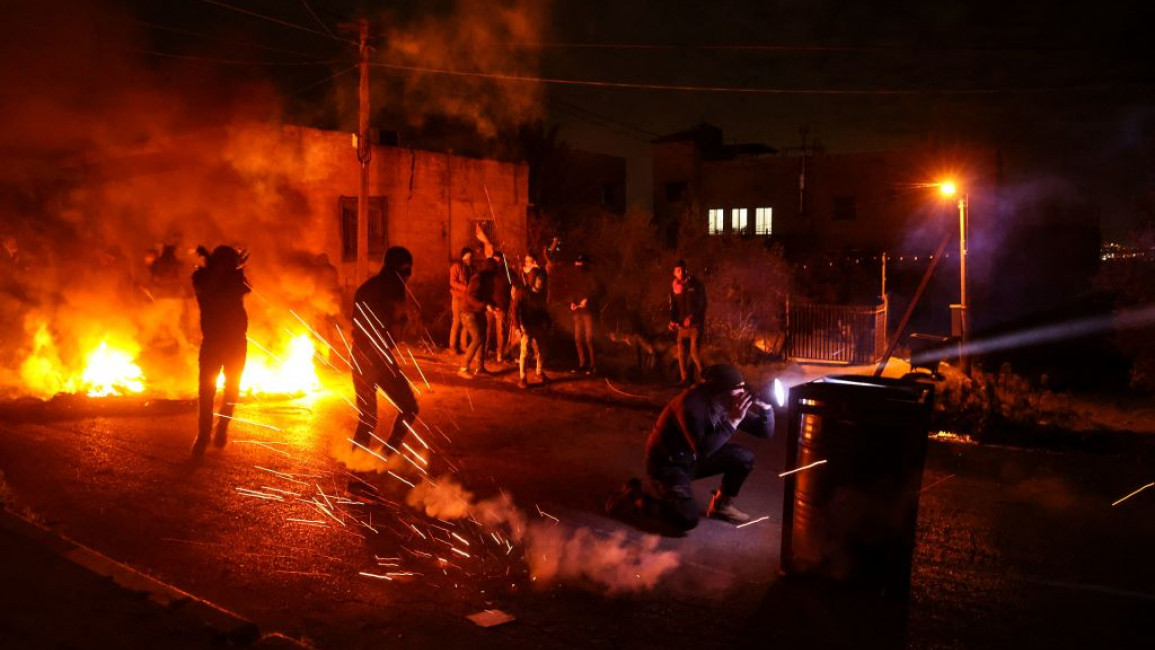
Abbas-Gantz Meeting: Killing the two-state solution with economic sedatives
The meeting between Israel's defence minister Benny Gantz and the Palestinian Authority's (PA) chairman Mahmoud Abbas at the former's residence is the first working session at this level inside Israel in over a decade.
Gantz reportedly pledged to provide the PA with a $US 32 million loan deducted from the tax revenues collected on the PA's behalf by Israel; "legalise" the status of 9,500 Palestinians living in the occupied territories; grant dozens of PA officials VIP status, allowing them to pass through Israeli checkpoints unhindered; and issue additional permits to Palestinian businessmen.
Sure enough, soon after the PA's Civil Affairs Minister, Hussein Al-Sheikh, announced the meeting, PA and Fatah officials took to the cyberspace to praise the "brave" move as proof that Israel "surrendered to Palestinian demands."
Taking place two days before Fatah's 57th anniversary, the meeting was ritualised as a Fatah's present to the Palestinian people, using its outcome to reemphasise the PA's approach - and by extension, Fatah's - is the only way forward.
Should Israel follow through on these pledges, which were apparently incentivised by the Biden administration, Palestinian lives in the West Bank and - to a lesser extent - Gaza could improve slightly.
The loan will help the financially ailed PA pay the salaries of over 150,000 PA employees, 65,000 of whom are security personnel. All parties in the conflict are aware that economic collapse is the final hair between miserable yet manageable life under the occupation and complete meltdown, possibly a third intifada.
Allowing family reunions, a preemptory human right framed by Israel as a concession, between Palestinians living in the territories and their spouses and siblings abroad, serve as an Israeli "humanitarian gesture" presumably to add depth and credibility to the economic pledges.
Neither the economic nor the humanitarian aspects, however, are sustainable without a political solution, a prospect that Israeli PM Naftali Bennett, much like his predecessor, repeatedly struck down. The non-political measures act only as sedatives to temporarily mute the ongoing state of human rights infringements in the territories.
Moreover, there are no guarantees that the Israeli government will follow through on Gantz's pledges. In late August 2021, after meeting with Abbas in Ramallah, Gantz pledged to issue thousands of new identity cards to Palestinians, but ultimately only 1,200 were handed out.
As the occupying power, Israel has the final say. Any further "gestures," therefore, let alone the fulfilment or earlier pledges, will most certainly be contingent on how the Palestinian Authority acts. As always, the keyword here is Israel's "security."
The PA is expected to intensify its efforts to prevent the possibility of another Intifada or the re-emergence of armed resistance in the West Bank. Abbas repeatedly stressed that he opposed any violent resistance, and in his meeting with Gantz reiterated this position saying he will "continue to denounce violence and 'terrorism' even if a gun had been pointed to his head."
Rather than on moral or legal grounds, politically Abbas view armed resistance against Israel as counterproductive. Perhaps intrinsic to this view stems from the fact that Jewish history, especially in the first half of the 20th century in Europe and North America, has been characterised by fear and annihilation. Violent resistance only strengthens Israeli society’s salient sense of victimhood, deepens militarism, and diminishes any political polarisation that may benefit the Palestine cause.
To counter-balance this seemingly unpopular position Abbas has, it was circulated that the Palestinian leader protested to Gantz against the settler violence. Also, Abbas allegedly suggested reviewing the steps taken against Israel at the International Criminal Court should Israel commit to significant political steps.
Very few in the PA actually believe that giving Israel incentives will lead anywhere. Abbas’ show of bravado was only meant to tell Palestinians that the helpless PA still has a few tricks up its sleeve and to emphasise that peaceful resistance is the only strategic option. After all, the Gaza war in May last year had shown - much to Israel and the PA’s horror - that Palestinians in the territories and Israel were pondering the merits of pursuing yet another wave of armed or violent resistance to break Israel's intransigence.
Now more than ever, Abbas has to prove that his way of moderation and diplomacy, which yet to yield tangible results, can actually achieve something, even if in the form of limited easing of Israeli oppressive measures that should not exist in the first place.
To that end, the PA is also willing to take credit for Palestinian sacrifices as its own. Consider that after 141 days on hunger strike which finally forced Israel to issue his release, the Palestine state TV attributed Hisham Abu Hawwash's "end of predicament" to Abbas' efforts.
This is all political realism and Abbas' approach might be as good as it gets, Abbas' cronies would say. To every other Palestinian faction, the approach is unimpressive and nothing but defeatism disguised as diplomacy.
To most Palestinians, the question is not about whether the PA has a bargaining chip or is able to "snatch" compromises from Israel, not even about doing its best. Rather, it is about the bigger issues of repeating old and tested patterns yet expecting different results.
The general belief is that the endless cycles of negotiations or entreating for a political process has been fruitless, if not humiliating. There is even some understanding that Abbas may be a choice-less victim in severely asymmetrical bargaining almost exclusively geared toward Israeli interests, with unconditional support from the US.
The "Oslo trap," as it came to be known, has locked the Palestinian leadership in a perpetual irony where the occupied protects the security of the occupier for measly economic and humanitarian gains
Most Palestinian believe that beyond recognising them as a people, Israeli leaders have had no intention to take a step beyond that. The PLO traded the recognition of the state of Israel - the entity that had colonised its homeland and continues to occupy it - with minimal recognition that has not gone beyond conditional and incomplete autonomy, one that eventually outsourced much of the occupation's burden to Palestinians themselves.
With this system in place, it is unsurprising that minor economic incentives and some humanitarian gestures are celebrated as achievements by the PA.
Meanwhile, the general public, the ones who do not possess VIP passes to sail through Israeli checkpoints, know that managing the occupation through economic sedatives will wear out eventually.
They also know that a complete meltdown is exactly what the Abbas-Gantz meeting was mostly trying to delay.
Dr Emad Moussa is a researcher and writer who specialises in the politics and political psychology of Palestine/Israel.
Follow him on Twitter: @emadmoussa
Have questions or comments? Email us at: editorial-english@alaraby.co.uk
Opinions expressed in this article remain those of the author and do not necessarily represent those of The New Arab, its editorial board or staff.




